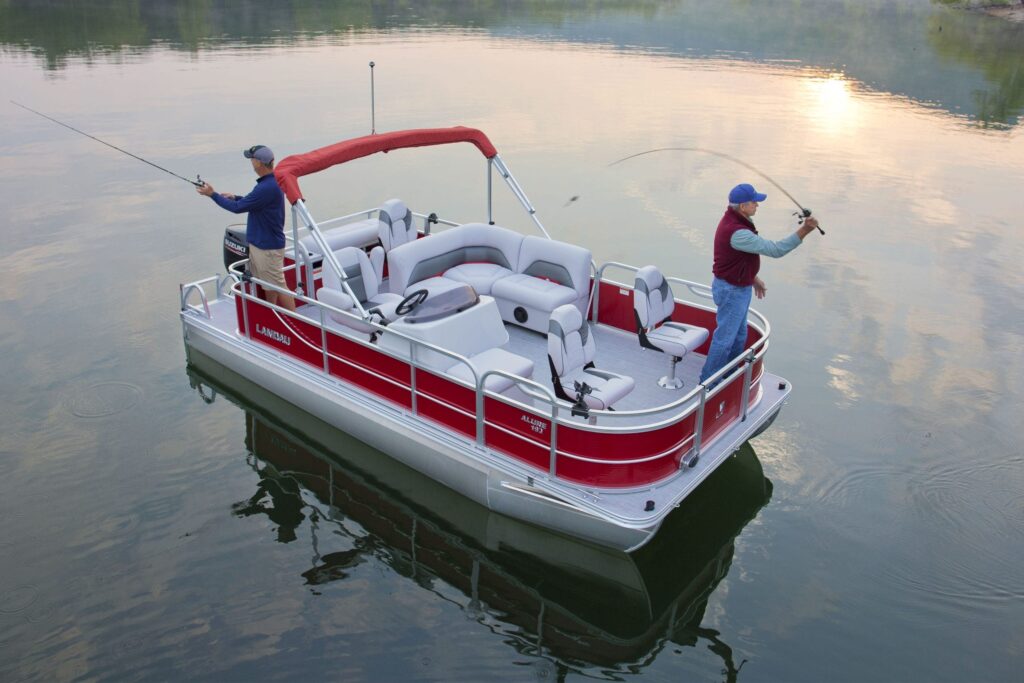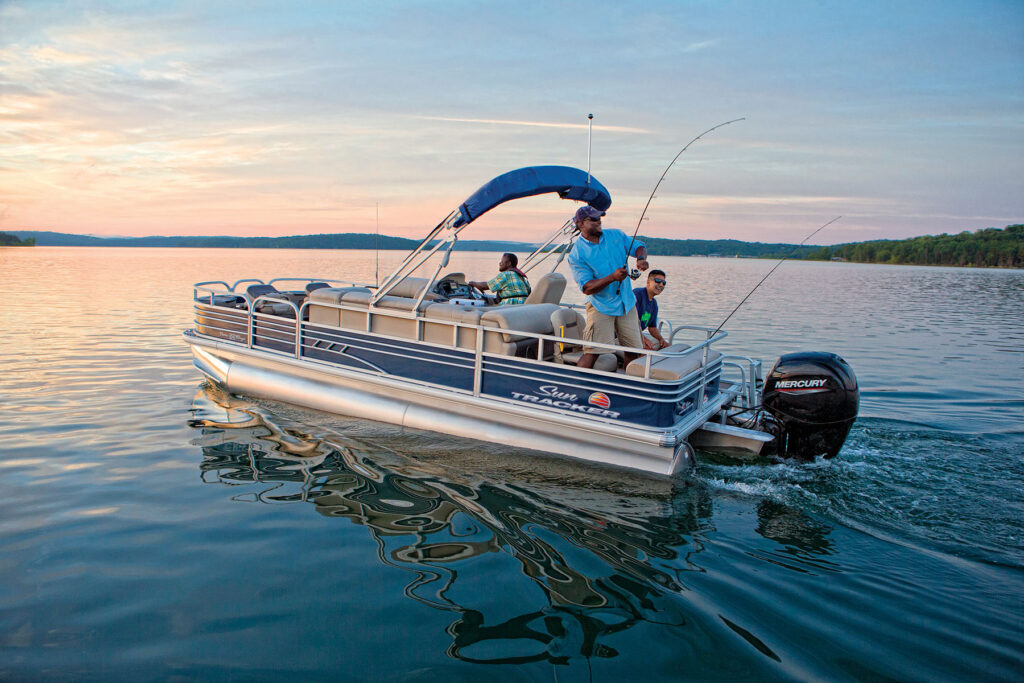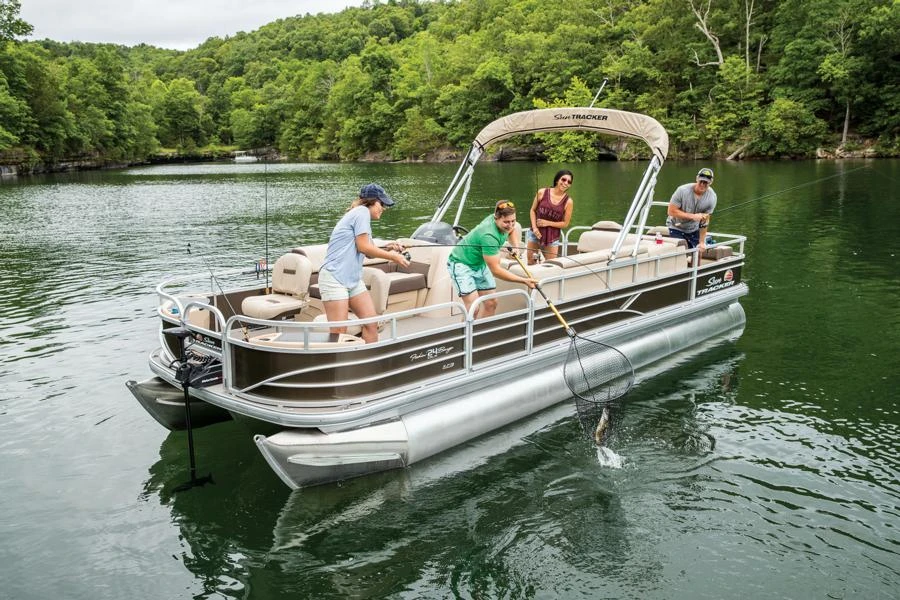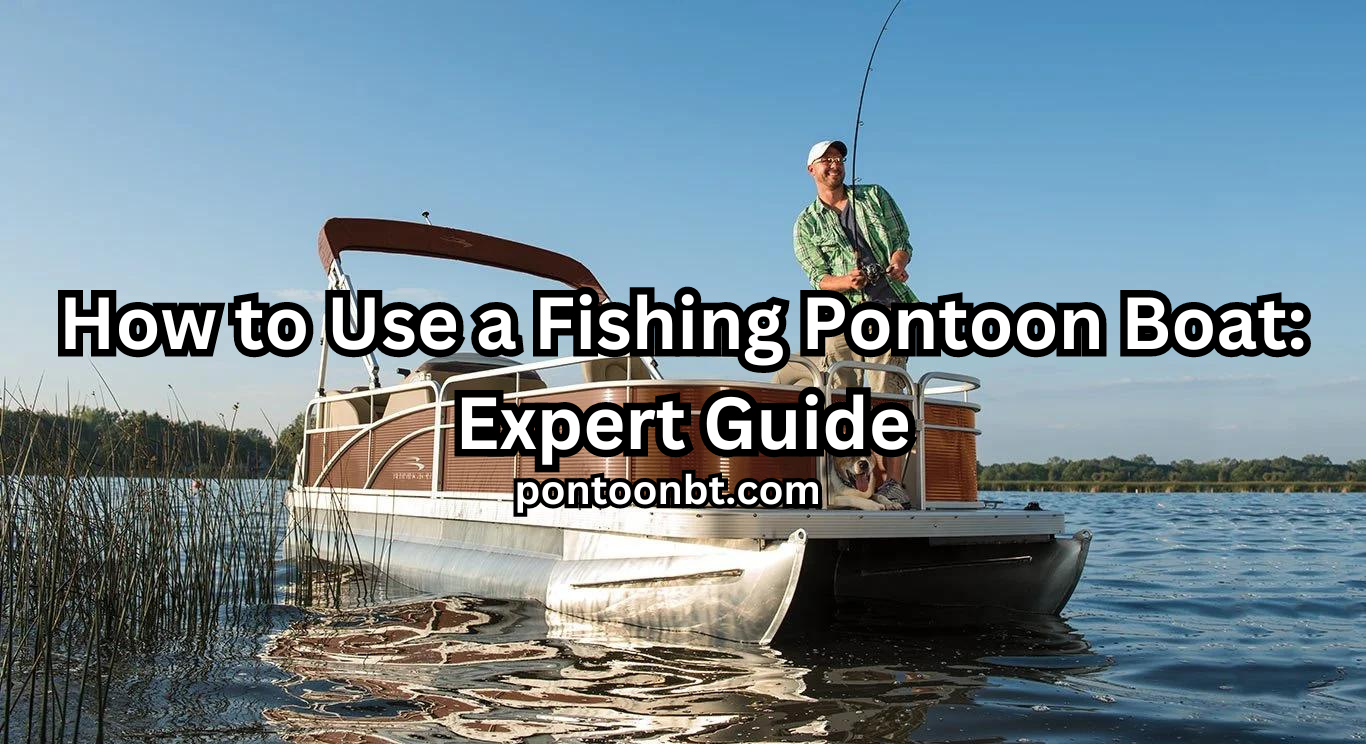Pontoon fishing offers a special experience, mixing luxury with flexibility whether an experienced fisherman or an amateur, conversing with the proper use of a fishing pontoon boat can improve your fishing adventures, which this comprehensive guide aims to provide.
Why Choose a Fishing Pontoon Boat?
Anglers have various reasons for choosing fishing pontoon boats. Their stability, capacity and customization options make them suitable for both individual or group trips. Unlike ordinary angling boats, pontoon boats offer a stable platform which reduces chances of capsizing even in rough waters. Large decks make movement easy and allow you bring your family, friends and all the equipment you may need along.
Key Features of a Fishing Pontoon Boat

Stable Deck Design: The pontoon boat’s broad base provides unrivaled stability, enabling anglers to cast lines, reel in fish and move about the vessel without fear of toppling over.
Ample Seating and Storage: These boats are designed with comfort and convenience in mind hence the numerous seating options and storage compartments. The additional space ensures that you carry everything needed while also offering simplicity when keeping your catch.
Customizable Layout: Many pontoon boats come with interchangeable seats and storage setups that enable one to customize their boat’s layout depending on their particular fishing requirements.
Enhanced Fishing Accessories: Such accessories include rod holders, live wells, fish finders or trolling motors installed on these vessels amongst others making them more efficient while at it enjoyable.
Getting Started: Preparing Your Fishing Pontoon Boat
To begin with it’s necessary to ensure your fishing pontoon boat is ready before hitting the water. Essential steps include:
Inspecting and Maintaining Your Boat
Routine maintenance is important for keeping your equipment running smoothly throughout the season. Therefore always check engine performance levels, batteries and fuel reserves before every trip. Also inspect pontoons for possible cracks and holes while ensuring that bilge pump is working well. Cleaning the deck, seats and storage compartments regularly will help to prevent mold or mildew.
Organizing Your Fishing Gear
To be successful in your fishing expedition. You need to organize your gear systematically. Arrange your fishing rods, tackle boxes, nets and bait in a location that is easy to reach. Besides you can use the storage bins to keep off any debris on the floor so that you have enough room on the boat when moving around. In addition, there should always be a specified area on the boat for safety gear like life jackets, first aid kits and fire extinguishers.
Plan Your Fishing Strategy
Before embarking on fishing it’s important to know what kind of water you are angling in. You might as well research the area and identify potential fish hotspots. Therefore, plan accordingly where necessary. Consider the time of day and weather patterns due to their influence on fish activities. A clear-cut strategy will enable one to utilize his or her entire day fishing, thus making it productive while being at ease.
Tips for Running Your Fishing Pontoon Boat Successfully

Now that you have made the necessary preparations, it is now time to look at how to operate it efficiently. Below are some expert tips that will improve your fishing experience.
Invest in Anchoring Skills
When you are fishing from a pontoon boat, proper anchoring is indispensable. The boat’s stability makes anchors useful in different types of waters. When fishing on a river or lake or even along coastal areas, just be sure to get the right anchor depending on depth and water type. Before you start fishing, drop the anchor slowly and ensure it has taken hold. This helps keep your boat steady so that your attention remains focused on catching fish.
Use the Trolling Motor
A trolling motor is indispensable for any fishing pontoon boat. It allows you to move stealthily through water without disturbing fish. You can use the trolling motor to navigate shallow waters or stay stationary at a fishing spot without necessarily using the main engine. Learning how to control the speed and direction of a trolling motor will improve your maneuverability and increase your chances of success.
Make Full Use of Fishing Electronics
Modern pontoon boats used for fishing are often fitted with advanced electronics such as fish finders and GPS systems among others. These devices can help you pinpoint fish and steer clear of uncharted territories thus making your angling more productive. Know how to read data from your fish finder while utilizing GPS system for marking potential future target points.
Modify Your Angling Techniques
From casting and trolling to bottom-fishing, many techniques can be employed when fishing from a pontoon boat. Adapt them according to what species you want and the existing water conditions around you. The stability of pontoon boats guarantees precise pinpoint casting while their wide deck prevents tangling during method changeovers.
Safety Measures That Must Be Followed In Any Fishing Pontoon Boat

Operating any vessel including those used for angling should always be done with safety as a priority. Here are some important safety tips.
Wear A Life Jacket
Whether or not you can swim, wearing a life jacket is compulsory. Ensure that all the passengers have well-fitting life jackets that comply with regulations. Keep extra life jackets in case of emergency.
Keep an Eye on Weather Changes
Before embarking, check the local weather forecast. Be ready to return if any severe changes occur. Strong winds, heavy rains or even lightning can put your life at risk when you are in the water.
Understand Boating Laws
You must familiarize yourself with boating laws and regulations in your locality, such as speed limits, no-wake zones, and fishing regulation guidelines. Ensure you always carry any permits and licenses and that your boat is registered accordingly while meeting security measures.
Emergency Preparedness
Your boat should be equipped with basic safety equipment such as flares, fire extinguishers, first aid kits and radios/cellphones for communication amongst others. Learning how to use these tools may save lives in cases of emergency. Passengers should know where this equipment is located and how it works.
Taking Care of Your Fishing Pontoon Boat for Longer Periods
Proper long-term maintenance of your fishing pontoon boat will ensure that it remains in top condition for years to come—as long as you want it!
Regular cleaning and inspection
It is important to clean your vessel well after every journey. Remove all unwanted materials, rinse the deck and wash the seats and storage areas. The pontoon tubes, engine, and electrical systems require regular checks since they could become serious issues.
Winterizing Your Boat
If you live in a cold winter region, make sure you winterize your pontoon boat. Flush the fuel system, disconnect the battery and then cover it for protection against bad weather. It will help prevent damage by freezing temperatures thus prolonging its lifespan.
Schedule Professional Maintenance
In addition to what you do, schedule professional maintenance regularly. An authorized technician will undertake enhanced surveillance and repairs so that your boat remains safe and functional.
Conclusion: Enjoying Your Time on the Water
However, if one knows how to use it effectively, fishing from a pontoon boat can be an extremely enjoyable experience. When you are out on a fishing trip, improve on it by following these hints, which have been discussed above, ensuring safety, success, and fun each time.
Read More:
https://pontoonbt.com/pontoon-boat-fishing-rod-holders-a-buyers-guide/
https://pontoonbt.com/fishing-pole-holders-for-pontoon-boat-adventure/
https://pontoonbt.com/who-makes-the-best-fishing-pontoon-boat/

